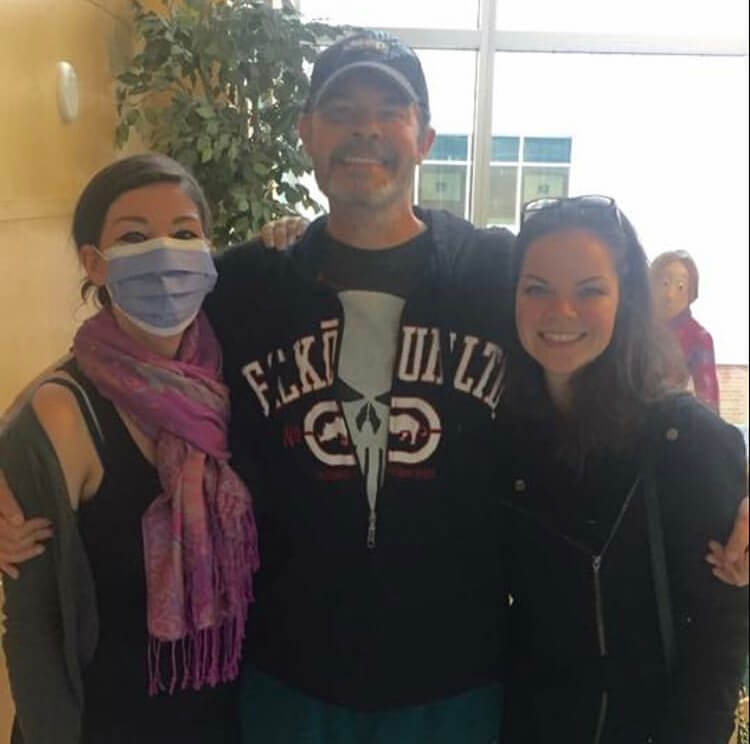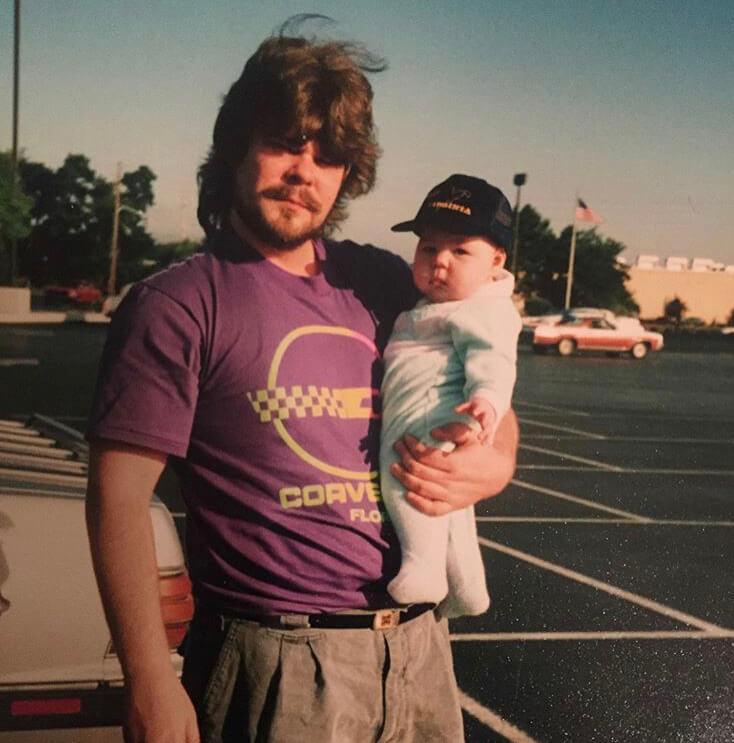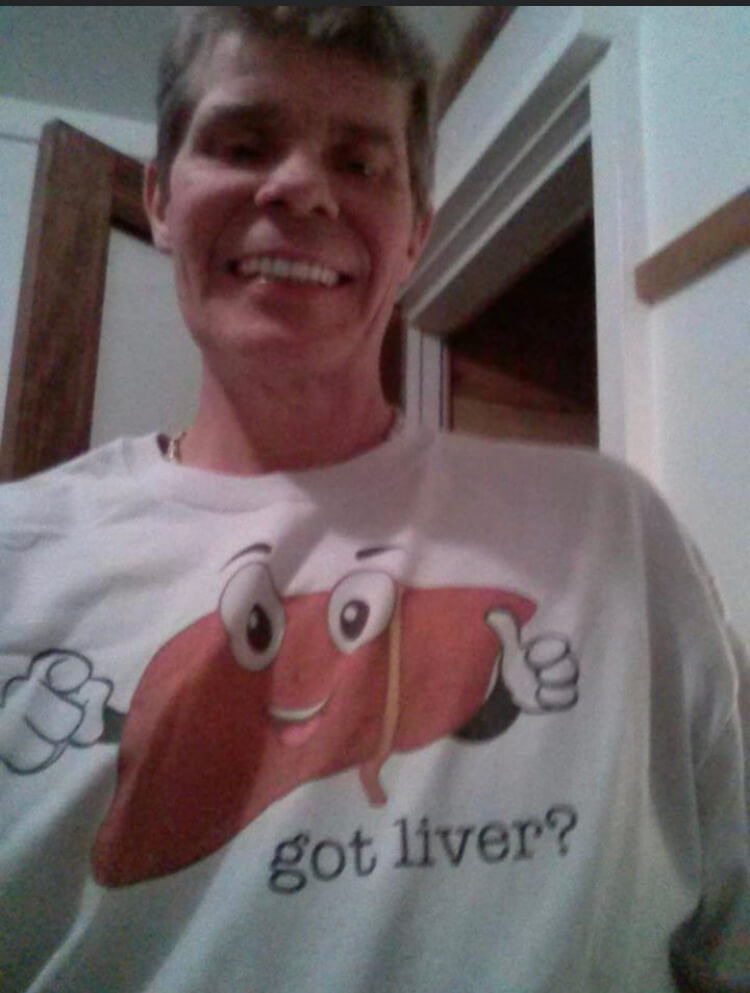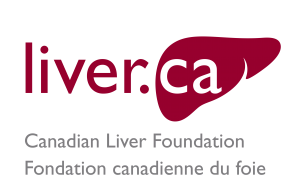Stroller Spotlight – Fighting the Stigma of Liver Disease

STROLLER SPOTLIGHT
Fighting the Stigma of Liver Disease: My Family Legacy
 It was mid-July in 2013 that my father, Dale, went to see his family doctor with harsh pains in his abdomen. The doctor instructed my dad to go to the hospital immediately. Not long afterwards, my father was told he had advanced liver failure and likely didn’t have long to live, as the damage was quite extensive. After the prognosis, we started to realize that my dad had actually been exhibiting symptoms of liver failure over the past several years—as early as 2007; however, despite visits to the doctor during that time, Dad’s liver had gone unchecked and Dad undiagnosed. I distinctly remember my father’s first most noticeable symptom, swelling in his feet and ankles. “I feel like I’m walking on loaves of bread,” he would jokingly say.
It was mid-July in 2013 that my father, Dale, went to see his family doctor with harsh pains in his abdomen. The doctor instructed my dad to go to the hospital immediately. Not long afterwards, my father was told he had advanced liver failure and likely didn’t have long to live, as the damage was quite extensive. After the prognosis, we started to realize that my dad had actually been exhibiting symptoms of liver failure over the past several years—as early as 2007; however, despite visits to the doctor during that time, Dad’s liver had gone unchecked and Dad undiagnosed. I distinctly remember my father’s first most noticeable symptom, swelling in his feet and ankles. “I feel like I’m walking on loaves of bread,” he would jokingly say.
At the time of his diagnosis, my dad lived in a small rural northwestern community in British Columbia, where he worked in mental health and addictions and was well known for his more than 25 years of sobriety. While we will never know for sure, our family strongly suspects that Dad’s well-known sobriety may have acted as a barrier to diagnosis. In fact, a common joke in our household—stemming from a complete lack of understanding surrounding liver disease—was that liver health was the last thing my dad would ever have to worry about. And yet, Dad was one of the more than 250,000 Canadians born between 1945 and 1975 unknowingly living with the Hepatitis C virus, one of the most common forms of viral hepatitis that strike thousands of Canadians every year, causing short-term illness, chronic infections, and even life-threatening consequences.
 Hepatitis C is often referred to as a “silent” disease because in many cases that turn chronic, no symptoms appear until the liver is severely damaged. It is spread through blood-to-blood contact, and people may risk exposure by using injection drugs (even once); getting tattoos, piercings, pedicures, manicures, or medical procedures with improperly sterilized equipment; sharing personal hygiene items with an infected person (e.g., razors, toothbrushes, nail clippers); or having had a blood transfusion or received blood products prior to July 1990.
Hepatitis C is often referred to as a “silent” disease because in many cases that turn chronic, no symptoms appear until the liver is severely damaged. It is spread through blood-to-blood contact, and people may risk exposure by using injection drugs (even once); getting tattoos, piercings, pedicures, manicures, or medical procedures with improperly sterilized equipment; sharing personal hygiene items with an infected person (e.g., razors, toothbrushes, nail clippers); or having had a blood transfusion or received blood products prior to July 1990.
My family was alarmed and saddened by my father’s bleak prognosis, but we were thankful that he was quickly placed on the transplant list. Even though family members were considered and screened for a living liver transplant, in the end no one was deemed suitable and Dad would have to wait for a cadaver.
The next two years were rough. My father was in and out of the hospital with multiple extremely close calls—but even with all the visits to the ER and lengthy hospital stays, he almost always maintained an optimistic outlook. Dad was determined to live and to make the best of an otherwise terrible situation, cracking jokes at his own expense routinely.
Unfortunately, despite my dad’s optimism, his health was deteriorating rapidly. Sometime in May 2015, he was diagnosed with cancer in his abdomen. In the midst of this disheartening situation, on June 19—only a month after the cancer diagnosis—Dad received the call: he had a liver waiting for him in London, Ont.! That night he and my younger sister, Rebeccah, made the drive down. The next morning on June 20, Rebeccah’s 20th birthday, my father went in to receive his much-anticipated liver transplant. Our whole family breathed a sigh of relief for the first time in a long time.
 After the transplant, my father’s recovery was slow and difficult, but at least his optimism had finally paid off—or so our family thought. Despite some apparent improvement, by Thanksgiving of 2015, Dad was back in the hospital with an infection and early signs of rejection; his team increased the dosage of his anti-rejection drugs, and he was released after a few days in the ICU. By Christmastime that year, my dad appeared to be back to his old self and was even well enough to go back to work. His energy levels were finally increasing, and he could walk for more than 10 minutes without needing to sit down and rest.
After the transplant, my father’s recovery was slow and difficult, but at least his optimism had finally paid off—or so our family thought. Despite some apparent improvement, by Thanksgiving of 2015, Dad was back in the hospital with an infection and early signs of rejection; his team increased the dosage of his anti-rejection drugs, and he was released after a few days in the ICU. By Christmastime that year, my dad appeared to be back to his old self and was even well enough to go back to work. His energy levels were finally increasing, and he could walk for more than 10 minutes without needing to sit down and rest.
My father’s long-awaited relief turned out to be short-lived, however. On New Year’s Day of 2016, Dad went to the ER with pain and discomfort. After numerous tests spanning nearly the entire month of January, he was flown down to London to be examined. In early February, my dad called to tell me that he had apparently been “on a lethal dosage” of anti-rejection drugs since Thanksgiving; and on February 4, our family received the news that he had terminal cancer and only “months” to live. In reality, it was worse than that. The expected “months” turned out to be less than three weeks. On February 23, 2016, Dad passed away peacefully while listening to his long-time friend Doug sing and play the guitar that once belonged to his own father. My dad was only 49 years old. At the time, I, his oldest daughter, was only 23, and my younger sister was only 20. This loss was devastating to our entire family.
 Even though my father had been extremely sick for over two years, his death still came as a shock to our family. We had braced for the worst while he was awaiting a transplant, but definitely not after he received it—and most certainly not when it came to the prescribed dosage of his anti-rejection drugs. And yes, while his death could perhaps have been prevented had he been receiving the proper dosage, ultimately, had his liver failure and Hepatitis C been caught earlier, he likely might not have required a transplant in the first place. My father’s Hepatitis C status was missed repeatedly—and consequently, so were his chances for early treatment and survival.
Even though my father had been extremely sick for over two years, his death still came as a shock to our family. We had braced for the worst while he was awaiting a transplant, but definitely not after he received it—and most certainly not when it came to the prescribed dosage of his anti-rejection drugs. And yes, while his death could perhaps have been prevented had he been receiving the proper dosage, ultimately, had his liver failure and Hepatitis C been caught earlier, he likely might not have required a transplant in the first place. My father’s Hepatitis C status was missed repeatedly—and consequently, so were his chances for early treatment and survival.
When I tell someone my dad passed away from a liver-related illness, one of the most common assumptions I hear is that he must have been an alcoholic or some other kind of substance abuser. These misconceptions are only compounded by the stigma associated with Hepatitis C. Many people think that a person’s own lifestyle decisions ultimately lead to his or her adverse health outcome, and the most troubling and tragic part of that assumption is that the person is deemed less worthy of sympathy. While we don’t know how and when my dad contracted Hepatitis C, we do know now that this is a common virus afflicting over a quarter million Canadians—many of whom don’t know they have it and all of whom are deserving of sympathy and respect.
 Since losing my father in 2016, I’ve become increasingly determined to reduce the stigma surrounding liver disease and Hepatitis C. Incredible advances in the fight against Hepatitis C have been made. However, an estimated 250,000 Canadians have this potentially life-threatening virus, and because many don’t even know it, they don’t receive treatment early enough. Further, despite significant advances in research, there’s still much more to uncover. New treatments must be created if we are to help those one in four Canadians who may be affected by liver disease.
Since losing my father in 2016, I’ve become increasingly determined to reduce the stigma surrounding liver disease and Hepatitis C. Incredible advances in the fight against Hepatitis C have been made. However, an estimated 250,000 Canadians have this potentially life-threatening virus, and because many don’t even know it, they don’t receive treatment early enough. Further, despite significant advances in research, there’s still much more to uncover. New treatments must be created if we are to help those one in four Canadians who may be affected by liver disease.
As it stands, raising awareness is key to increased testing and has been my primary goal in becoming involved with the Canadian Liver Foundation. My father dedicated his career to helping people overcome addictions and helped countless people improve their lives, and I hope that by telling his story and spreading awareness I can continue his legacy of helping people regain health, hope, and wholeness.
Support Abby’s STROLL for LIVER fundraising page here.





